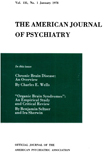CLINICAL EVALUATION OF A NEW ANTIDEPRESSANT: G-33040
Abstract
G-33040 was administered to 18 depressed patients in a general hospital setting. Of these, 15 ( 83%) were rated as being somewhat or much improved. It is of note that 2 of the 3 patients who did not respond to this medication were also resistant to other antidepressant therapy. Fourteen of our patients showed a small but noticeable decrease in manifest anxiety following administration of the drug.
At the dosage used, no subjective side-effects were noted. There was no hypotensive effect and no urinary or blood changes. Elevation of total serum bilirubin from 0.80 to 1.20 mgm. % ( normal under 0.90) and elevation of prothrombin time from 13 sees. to 14 secs. ( control 12 secs.) was noted in one patient. However transaminase and cephalin flocculation remained normal and unchanged.
It would appear that G-33040 is a safe and useful antidepressant in a general hospital setting.
Access content
To read the fulltext, please use one of the options below to sign in or purchase access.- Personal login
- Institutional Login
- Sign in via OpenAthens
- Register for access
-
Please login/register if you wish to pair your device and check access availability.
Not a subscriber?
PsychiatryOnline subscription options offer access to the DSM-5 library, books, journals, CME, and patient resources. This all-in-one virtual library provides psychiatrists and mental health professionals with key resources for diagnosis, treatment, research, and professional development.
Need more help? PsychiatryOnline Customer Service may be reached by emailing [email protected] or by calling 800-368-5777 (in the U.S.) or 703-907-7322 (outside the U.S.).



